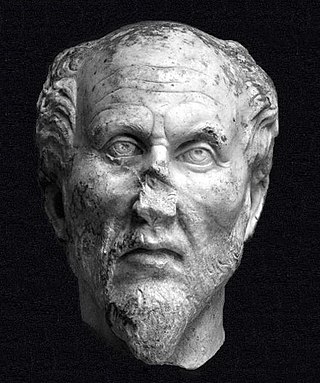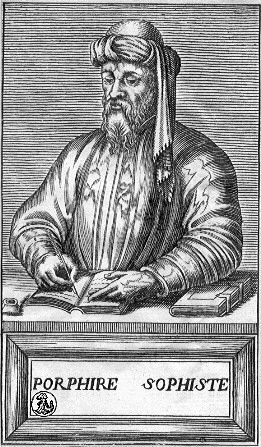Ammonius Hermiae was a Greek philosopher from Alexandria in the eastern Roman empire during Late Antiquity. A Neoplatonist, he was the son of the philosophers Hermias and Aedesia, the brother of Heliodorus of Alexandria and the grandson of Syrianus. Ammonius was a pupil of Proclus in Roman Athens, and taught at Alexandria for most of his life, having obtained a public chair in the 470s.
Ammonius Saccas was a Hellenistic Platonist self-taught philosopher from Alexandria, generally regarded as the precursor of Neoplatonism and/or one of its founders. He is mainly known as the teacher of Plotinus, whom he taught from 232 to 242. He was undoubtedly the most significant influence on Plotinus in his development of Neoplatonism, although little is known about his own philosophical views. Later Christian writers stated that Ammonius was a Christian, but it is now generally assumed that there was a different Ammonius of Alexandria who wrote biblical texts.
In the Platonic, Neopythagorean, Middle Platonic, and Neoplatonic schools of philosophy, the demiurge is an artisan-like figure responsible for fashioning and maintaining the physical universe. The Gnostics adopted the term demiurge. Although a fashioner, the demiurge is not necessarily the same as the creator figure in the monotheistic sense, because the demiurge itself and the material from which the demiurge fashions the universe are both considered consequences of something else. Depending on the system, they may be considered either uncreated and eternal or the product of some other entity.

Plato was an ancient Greek philosopher born in Athens during the Classical period.

Proclus Lycius, called Proclus the Successor, was a Greek Neoplatonist philosopher, one of the last major classical philosophers of late antiquity. He set forth one of the most elaborate and fully developed systems of Neoplatonism and, through later interpreters and translators, exerted an influence on Byzantine philosophy, Early Islamic philosophy, Scholastic philosophy, and German Idealism, especially G.W.F. Hegel, who called Proclus's Platonic Theology "the true turning point or transition from ancient to modern times, from ancient philosophy to Christianity."

Plotinus was a Greek Platonist philosopher, born and raised in Roman Egypt. Plotinus is regarded by modern scholarship as the founder of Neoplatonism. His teacher was the self-taught philosopher Ammonius Saccas, who belonged to the Platonic tradition. Historians of the 19th century invented the term "neoplatonism" and applied it to refer to Plotinus and his philosophy, which was vastly influential during late antiquity, the Middle Ages, and the Renaissance. Much of the biographical information about Plotinus comes from Porphyry's preface to his edition of Plotinus' most notable literary work, The Enneads. In his metaphysical writings, Plotinus described three fundamental principles: the One, the Intellect, and the Soul. His works have inspired centuries of pagan, Jewish, Christian, Gnostic, and early Islamic metaphysicians and mystics, including developing precepts that influence mainstream theological concepts within religions, such as his work on duality of the One in two metaphysical states.
The Enneads, fully The Six Enneads, is the collection of writings of the philosopher Plotinus, edited and compiled by his student Porphyry. Plotinus was a student of Ammonius Saccas, and together they were founders of Neoplatonism. His work, through Augustine of Hippo, the Cappadocian Fathers, Pseudo-Dionysius the Areopagite and several subsequent Christian and Muslim thinkers, has greatly influenced Western and Near-Eastern thought.

Porphyry of Tyre was a Neoplatonic philosopher born in Tyre, Roman Phoenicia during Roman rule. He edited and published The Enneads, the only collection of the work of Plotinus, his teacher.

Platonism is the philosophy of Plato and philosophical systems closely derived from it, though contemporary Platonists do not necessarily accept all doctrines of Plato. Platonism had a profound effect on Western thought. In its most basic fundamentals, Platonism affirms the existence of abstract objects, which are asserted to exist in a third realm distinct from both the sensible external world and from the internal world of consciousness, and is the opposite of nominalism. This can apply to properties, types, propositions, meanings, numbers, sets, truth values, and so on. Philosophers who affirm the existence of abstract objects are sometimes called Platonists; those who deny their existence are sometimes called nominalists. The terms "Platonism" and "nominalism" also have established senses in the history of philosophy. They denote positions that have little to do with the modern notion of an abstract object.
Gnosticism refers to a collection of religious groups originating in Jewish religiosity in Alexandria in the first few centuries AD. Neoplatonism is a school of Hellenistic philosophy that took shape in the 3rd century, based on the teachings of Plato and some of his early followers. While Gnosticism was influenced by Middle Platonism, neoplatonists from the third century onward rejected Gnosticism. Nevertheless, Alexander J. Mazur argues that many neoplatonic concepts and ideas are ultimately derived from Sethian Gnosticism during the third century in Lower Egypt, and that Plotinus himself may have been a Gnostic before nominally distancing himself from the movement.
Arthur Hilary Armstrong, was an English educator and author. Armstrong is recognized as one of the foremost authorities on the philosophical teachings of Plotinus. His multi-volume translation of the philosopher's teachings is regarded as an essential tool of classical studies.
John Myles Dillon is an Irish classicist and philosopher who was Regius Professor of Greek in Trinity College, Dublin between 1980 and 2006. Prior to that he taught at the University of California, Berkeley. He was elected a corresponding member of the Academy of Athens on 15 June 2010. Dillon's area of research lies in the history of Platonism from the Old Academy to the Renaissance, and also Early Christianity.
Neoplatonism was a major influence on Christian theology throughout Late Antiquity and the Middle Ages in the East, and sometimes in the West as well. In the East, major Greek Fathers like Basil, Gregory of Nyssa and Gregory of Nazianzus were influenced by Platonism and Neoplatonism, but also Stoicism often leading towards asceticism and harsh treatment of the body, for example stylite asceticism. In the West, St. Augustine of Hippo was influenced by the early Neoplatonists Plotinus and Porphyry. Later on, in the East, the works of the Christian writer Pseudo-Dionysius the Areopagite, who was influenced by later Neoplatonists such as Proclus and Damascius, became a critical work on which Greek church fathers based their theology, like Maximus believing it was an original work of Dionysius the Areopagite.
David Neil Sedley FBA is a British philosopher and historian of philosophy. He was the seventh Laurence Professor of Ancient Philosophy at Cambridge University.
Anthony Arthur Long FBA is a British-American classical scholar who is the Chancellor's Professor Emeritus of Classics, Irving Stone Professor of Literature Emeritus, and Affiliated Professor of Philosophy and Rhetoric at the University of California, Berkeley.
Commentaries on Plato refers to the great mass of literature produced, especially in the ancient and medieval world, to explain and clarify the works of Plato. Many Platonist philosophers in the centuries following Plato sought to clarify and summarise his thoughts, but it was during the Roman era, that the Neoplatonists, in particular, wrote many commentaries on individual dialogues of Plato, many of which survive to the present day.
Neoplatonism is a version of Platonic philosophy that emerged in the 3rd century AD against the background of Hellenistic philosophy and religion. The term does not encapsulate a set of ideas as much as a series of thinkers. Among the common ideas it maintains is monism, the doctrine that all of reality can be derived from a single principle, "the One".
John Michael Rist is a British scholar of ancient philosophy, classics, and early Christian philosophy and theology, known mainly for his contributions to the history of metaphysics and ethics. He is the author of monographs on Plato, Aristotle, the Stoics, Epicurus, Plotinus, the dating of the Gospels, and Augustine. Rist is Professor of Classics Emeritus at the University of Toronto and part-time Visiting Professor at the Institutum Patristicum Augustinianum in Rome, held the Father Kurt Pritzl, O.P., Chair in Philosophy at the Catholic University of America in Washington, D.C., and is a life member of Clare Hall, Cambridge University. During his lengthy academic career he has been Regius Professor of Classics at the University of Aberdeen (1980-1983), Professor of Classics and Philosophy at the University of Toronto (1983–1996), and the Lady Davis Visiting Professor in Philosophy at the Hebrew University of Jerusalem (1995).

Many interpreters of Plato held that his writings contain passages with double meanings, called allegories, symbols, or myths, that give the dialogues layers of figurative meaning in addition to their usual literal meaning. These allegorical interpretations of Plato were dominant for more than fifteen hundred years, from about the 1st century CE through the Renaissance and into the 18th century, and were advocated by major Platonist philosophers such as Plotinus, Porphyry, Syrianus, Proclus, and Marsilio Ficino. Beginning with Philo of Alexandria, these views influenced the Jewish, Christian, and Islamic interpretation of these religions' respective sacred scriptures. They spread widely during the Renaissance and contributed to the fashion for allegory among poets such as Dante Alighieri, Edmund Spenser, and William Shakespeare.
Sebastian Ramon Philipp Gertz is a British-German historian of Ancient Philosophy.






